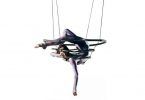Becoming a circus performer is a thrilling and rewarding career path, but it takes more than just talent to succeed. From developing world-class skills to staying professional and approachable, mastering these essential qualities can help you thrive as a freelance circus artist. This guide will show you how to be a circus performer by focusing on the three key traits that every successful artist needs.
There are so many reasons why you may or may not get a job as a circus artist. It might be your stage presence, your willingness to take direction, the quality of your existing act, or it might come down to the color of your hair. But three qualities will make you employable just about anywhere, and the best part is, any combination of the two will do.
How to Be a Successful Circus Performer:
1. Perfect Your Skills and Craft
Have a killer act or skill that you’ve busted your gut on for 10.000 hours – or whatever it is to become an expert. Train hard, train long and learn from the best. Blow your prospective employers away by being the only person in the world doing a quintuple twist from toes; or develop an entirely new act, combine unusual skills, and make yourself irreplaceable. This will take a lot of sacrifices: time, money, and social life, and you’ll need a bonfire inside you to make it.
2. Stay Organized and Professional
As an employer, there are few things more off-putting than waiting on a prospective employee to provide you with their invoice/availability/public liability insurance. Who needs who here?! Have your sh*t together so when asked, you can produce all paperwork as required, and to standard. Nobody is going to hire you from an email with ‘I’ll get my showreel to you really soon’ when they have six already sitting in their inbox.
3. Be a Team Player
Being amicable and approachable goes a long, long way. Especially in Circus where you may be on tour with the same people for eight months. But even for a one-night gig people will be much more willing to recommend you or ask you back in the future if they’ve had a good experience with you. Don’t be a doormat, but DO NOT be a diva. It’s fine for you to have certain needs for your performance, but ask nicely, and exercise flexibility where you can. Nobody is going out of their way to make your life difficult (if they are you should reassess that relationship). Furthermore, they will notice and appreciate your extra effort to make someone’s day easier.
Overcome Challenges: The Realities of Being a Circus Performer
Being a circus performer is not without its challenges, but knowing how to handle them is part of the journey:
- Injury Prevention: Stay conditioned with cross-training and take injury recovery seriously.
- Job Insecurity: Freelance work can be unpredictable, so maintain multiple revenue streams (e.g., teaching workshops or creating online content).
- Performance Pressure: Mental preparation and resilience are crucial. Consider learning more about mental health techniques for performers.
Why These Qualities Matter in a Circus Career
Think about these three things in real-life terms:
If you’re not necessarily the best aerial performer, but you’re super easy to communicate with and get things in on time, guaranteed you’ll be asked back again and again. If you have the most beautiful hand-balance act, but you’re always late getting back with details, and when you show up to a gig you’re demanding and sulky – well, you’re unlikely to make a second appearance. And if you are everybody’s best friend, and are incredible on stage, most employers will tolerate the fact you hardly ever reply to emails within the week.
You may already possess one or two, or perhaps you’re a triple threat and already have all three, go you! Investing time in any of these skills will give you more time to be paid for what you love.
Conclusion: Your Path to Becoming a Successful Circus Performer
Whether you’re an experienced circus performer or just starting your journey, remember these three essential traits: being highly skilled, being a punctual administrator, and being a nice person. Each of these qualities plays a crucial role in shaping your reputation as a freelance circus artist. By honing your skills, staying organized and professional, and maintaining a positive attitude, you can increase your chances of securing gigs and building a thriving circus career. Invest in developing these traits, and you’ll find yourself with more time to do what you love while being paid for it.







